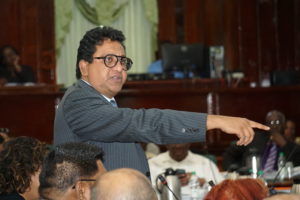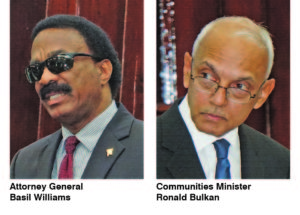
By Jarryl Bryan
Tabling of the Local Authority Amendment Act by Minister of Communities, Ronald Bulkan, may have in principle received support from the parliamentary Opposition; but that support was not unconditional, as the Government was confronted with the ghost of its actions in the past.
Among other things, the bill addresses the terms of office, tie resolution, and plurality principle, among other issues. During Monday’s sitting, Bulkan noted that if passed, the bill would allow for democratic election of regional leaders at all levels.
“Honourable members would be aware of the agenda of this administration to allow for democracy; in this regard, to honour Article 12 of the Constitution, which speaks to the democratic organs of the state,”
Bulkan explained.
He noted that the bill “seeks to amend six pieces of legislation; namely, the Municipal and District Council Act, Chapter 28:01; the Local Government

Act, specifically to Section 28; the Local Authorities Election Act, the Local Democratic Organs Act, Local Authority Elections Amendment Act 1990 to Section 7, and the Election Laws Amendment Act 2000 to Section 7:1.”
But People’s Progressive Party (PPP) frontbencher Anil Nandlall reminded the Government of its track record of appointments in Local Authority Areas (LAA) when ties resulted from Local Government Elections (LGE).
“Bulkan has regaled us on the bill before the house. And the Minister should have accepted credit for himself for bringing a bill to correct the wrong that he himself has committed,” Nandlall noted. “The law is very clear: Where there is a tie at the level of Chairman and Vice Chairman, and there is what the law calls an inability to elect one or the other because of the votes, the law says that the returning officer within 10 days must fix a date for by-elections: go back to the electorate that voted at the last election (and) with the two candidates instead of the list of candidates,” Nandlall explained.
“Where is the ambiguity in that? If the Honourable Minister, in violation of that law, imposes himself on the overseer? He challenged.
Attorney General Basil Williams has argued that Bulkan followed the procedure as spelled out, and with the resulting ties, acted according to the law. He stressed that the bill only seeks to clear up the issue, and claimed the opposition “cannot lecture us.”
Opposition MP Colin Croal backed up Nandlall’s arguments, noting that Bulkan is seeking to correct the wrongs he had already done. Taking on Williams’s contention that the government has provided the “good life” for the LAAs, Croal challenged Government to provide evidence of consultations.
His colleague Parliamentarian Allister Charlie also claimed that no consultations were carried out in Aranaputa. While the PPP raised objections due to several clauses in the bill and sought to have their amendments carried, the Government remained resolute against the inclusion of the PPP’s amendments.
Bulkan claimed that had the amendments been received earlier, they would have been considered.
Speaker of the House, Barton Scotland, revealed that the amendments were received on Monday.
The amendments were then read, at which time the numerical advantage of the Government side caused each and every amendment to be voted down. On that basis, the bill was passed as is.
It was only in March that the People’s Progressive Party/Civic (PPP/C) Councillors in Mabaruma had announced they had collectively decided to continue their boycott of all meetings chaired by incumbent Mayor Rupert Henry Smith after he was re-appointed Mayor by Communities Minister Ronald Bulkan.
In April of 2017, Justice Diana Insanally quashed the appointment of Smith, an APNU appointee, as the Mayor of Mabaruma, Region One, and ordered that fresh elections be held.
The ruling was as a result of PPP’s Zulfikar Mustapha challenging the decision by Bulkan to appoint a mayor after there had been a 6-6 tie in the number of seats won at the 2016 Local Government Election. A runoff produced similar results.



